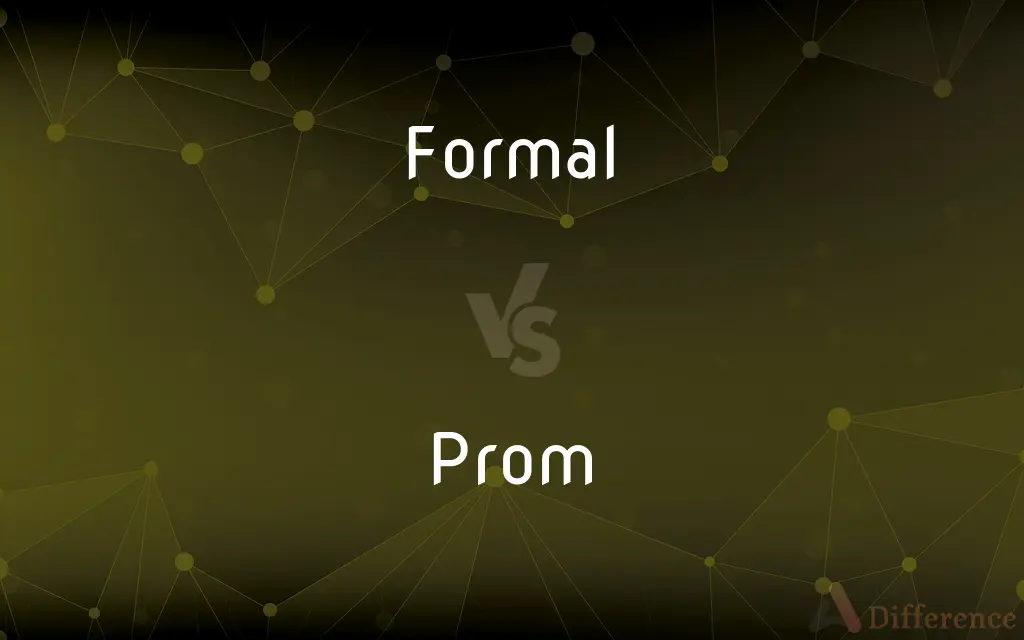Formal vs. Prom — What's the Difference?
By Fiza Rafique & Urooj Arif — Updated on April 3, 2024
Formal events encompass a broad range of ceremonies and gatherings, marked by strict dress codes and etiquette, while Prom is a specific type of formal event, typically a dance for high school students.

Difference Between Formal and Prom
Table of Contents
ADVERTISEMENT
Key Differences
Formal events are characterized by their adherence to traditional standards of dress, behavior, and decorum, encompassing occasions such as galas, weddings, and official ceremonies. They often require attire such as tuxedos or evening gowns, and the atmosphere is typically sophisticated. On the other hand, Prom is a celebratory event held towards the end of the high school year, focusing on juniors or seniors. It is a specific instance of a formal event, but with a more defined audience and purpose, celebrating the transition of students to the next stage in their lives.
While formal events cater to a broad audience, ranging from elder people to professionals across various sectors, prom is distinctly targeted towards high school students. This difference in audience significantly influences the themes, music, and activities planned for these events. Proms often feature themes that resonate with teenage interests, whereas formal events might not adhere to a theme and focus more on the occasion’s significance.
The dress code for formal events can vary significantly depending on the occasion, from black-tie to white-tie, requiring varying degrees of formality in attire. In contrast, Prom attire, while still formal, leans towards more youthful and trendy fashion choices, allowing for more creativity and personal expression within the bounds of formal wear.
Another key difference lies in the traditions and customs associated with each. Formal events may follow strict protocols, including seating arrangements, speeches, and formal dining rules, tailored to the event's nature. Prom, however, while still formal, allows for more social interaction among attendees, often featuring activities like prom courts and dance-offs, which are less common in other formal events.
The emotional significance of each event varies. Formal events can celebrate various milestones and achievements, depending on their nature, but prom specifically marks a pivotal moment in the lives of young people, symbolizing a rite of passage and often accompanied by a sense of nostalgia and anticipation for the future.
ADVERTISEMENT
Comparison Chart
Audience
Professionals, various sectors
High school juniors and seniors
Dress Code
Varies (black-tie, white-tie, etc.)
Formal, with a trend towards youthful fashion
Occasion
Broad (galas, weddings, ceremonies)
Specific (end-of-year high school celebration)
Traditions
Seating arrangements, speeches
Prom court, dance-offs
Emotional Significance
Varies by event
Marks a rite of passage for young people
Compare with Definitions
Formal
An occasion requiring elegant attire and decorum.
The gala was the most anticipated formal event of the year.
Prom
An event where students wear formal attire.
Finding the perfect dress for prom is a major milestone.
Formal
An event characterized by a sophisticated atmosphere.
The formal event was held at a prestigious venue. adding to its elegance.
Prom
A celebration that often includes a prom king and queen.
The highlight of prom was the crowning of the prom king and queen.
Formal
Ceremonies that celebrate significant milestones or achievements.
The award ceremony is a formal event recognizing exceptional talents.
Prom
A high school dance marking the end of the school year.
Prom night is one of the most memorable events for high school students.
Formal
A gathering that adheres to traditional etiquettes and dress codes.
Invitations to formal events often specify the expected dress code.
Prom
A formal event with a more relaxed atmosphere.
Prom allows students to celebrate in a formal yet fun environment.
Formal
Occasions that may follow strict protocols.
Formal events at the embassy follow a meticulous protocol for guests.
Prom
An occasion that symbolizes a rite of passage.
For many, prom signifies the transition from adolescence to adulthood.
Formal
Relating to or involving outward form or structure, often in contrast to content or meaning.
Prom
A promenade dance, commonly called a prom, is a dance party for high school students. It may be offered in semi-formal black tie or informal suit for boys, and evening gowns for girls.
Formal
Being or relating to essential form or constitution
A formal principle.
Prom
A kind of read-only memory whose contents can be set after manufacture, but only once.
Formal
Following or being in accord with accepted or prescribed forms, conventions, or regulations
Had little formal education.
Went to a formal party.
Prom
A formal dance held for a high-school or college class typically at or near the end of the academic year.
Formal
Characterized by strict or meticulous observation of forms; methodical
Very formal in their business transactions.
Prom
(British) A promenade concert.
Formal
Stiffly ceremonious
A formal greeting.
Prom
A promenade.
Formal
Characterized by technical or polysyllabic vocabulary, complex sentence structure, and explicit transitions; not colloquial or informal
Formal discourse.
Prom
(US) A formal ball held at a high school or college on special occasions; e.g,. near the end of the academic year.
Would you like to be my prom date?
Formal
Having the outward appearance but lacking in substance
A formal requirement that is usually ignored.
Prom
A formal ball held for a school class toward the end of the academic year
Formal
Something, such as a gown or social affair, that is formal in nature.
Formal
Being in accord with established forms.
She spoke formal English, without any dialect.
Formal
Official.
I'd like to make a formal complaint.
Despite efforts by limnologists and freshwater biologists to create a formal definition of “pond”, there is still no universal distinction between a “pond” and a “lake.”
Formal
Relating to the form or structure of something.
Formal linguistics ignores the vocabulary of languages and focuses solely on their grammar.
Formal
Relating to formation.
The formal stage is a critical part of any child's development.
Formal
Ceremonial or traditional.
Formal wear must be worn at my wedding!
Formal
Proper, according to strict etiquette; not casual.
He's always very formal, and I wish he'd relax a bit.
Formal
Organized; well-structured and planned.
When they became a formal club the rowers built a small boathouse.
Formal
(mathematics) Relating to mere manipulation and construction of strings of symbols, without regard to their meaning.
Formal series are defined without any reference to convergence.
Formal
(clothing) An evening gown.
Formal
An event with a formal dress code.
Jenny took Sam to her Year 12 formal.
Formal
(programming) A formal parameter.
Formal
(Oxbridge slang) formal hall.
Formal
(uncountable) Formalin.
Formal
An acetal formed from formaldehyde.
Formal
See Methylal.
Formal
Belonging to the form, shape, frame, external appearance, or organization of a thing.
Formal
Belonging to the constitution of a thing, as distinguished from the matter composing it; having the power of making a thing what it is; constituent; essential; pertaining to or depending on the forms, so called, of the human intellect.
Of [the sounds represented by] letters, the material part is breath and voice; the formal is constituted by the motion and figure of the organs of speech.
Formal
Done in due form, or with solemnity; according to regular method; not incidental, sudden or irregular; express; as, he gave his formal consent.
His obscure funeral . . . No noble rite nor formal ostentation.
Formal
Devoted to, or done in accordance with, forms or rules; punctilious; regular; orderly; methodical; of a prescribed form; exact; prim; stiff; ceremonious; as, a man formal in his dress, his gait, his conversation.
A cold-looking, formal garden, cut into angles and rhomboids.
She took off the formal cap that confined her hair.
Formal
Having the form or appearance without the substance or essence; external; as, formal duty; formal worship; formal courtesy, etc.
Formal
Sound; normal.
To make of him a formal man again.
Formal
Being in accord with established forms and conventions and requirements (as e.g. of formal dress);
Pay one's formal respects
Formal dress
A formal ball
The requirement was only formal and often ignored
A formal education
Formal
Characteristic of or befitting a person in authority;
Formal duties
An official banquet
Formal
(of spoken and written language) adhering to traditional standards of correctness and without casual, contracted, and colloquial forms;
The paper was written in formal English
Formal
Represented in simplified or symbolic form
Formal
Logically deductive;
Formal proof
Formal
Refined or imposing in manner or appearance; befitting a royal court;
A courtly gentleman
Common Curiosities
What is a formal event?
A formal event is a gathering that requires attendees to follow specific dress codes and etiquettes, such as black-tie galas or official ceremonies.
Are all formal events black-tie?
Not all formal events require black-tie attire; the dress code depends on the event's nature, ranging from black-tie to white-tie or even semi-formal.
Do formal events always have a strict protocol?
While many formal events follow strict protocols, the level of formality and adherence to protocol can vary based on the event's purpose and audience.
Can prom attire be considered formal wear?
Yes, prom attire is a subset of formal wear, tailored to suit the tastes and trends of high school students.
Can the location of a Prom be considered formal?
Yes, Proms are often held in formal locations such as banquet halls or hotels to match the event's formal attire and significance.
Can adults attend Prom?
Prom is typically reserved for high school students, though adults may attend as chaperones or guests of the school.
What makes Prom different from other formal events?
Prom is specifically designed for high school students to celebrate the end of their school year, featuring elements like prom courts and a focus on youthful, formal attire.
Is Prom celebrated worldwide?
While prom is predominantly a tradition in the United States, many countries have adopted similar end-of-school celebrations.
Are themes common in formal events?
Themes can be part of formal events but are more common and emphasized in Proms to add to the festivity and engagement of the students.
What is the significance of the prom king and queen?
The prom king and queen tradition celebrates popularity and school spirit, serving as a highlight of the event.
What is considered appropriate attire for a formal event?
Appropriate attire can range from evening gowns and tuxedos to suits and cocktail dresses, depending on the event's specified dress code.
Is there a difference in the music played at formal events and Prom?
Yes, the music at Prom is typically more contemporary and aligned with teenage preferences, whereas formal events may feature a wider range of genres, including classical music.
How important is dancing at Prom?
Dancing is a central activity at Prom, reflecting the event's celebratory and social nature.
Can formal events be fun?
Absolutely, while formal events maintain a degree of decorum, they can be enjoyable and memorable, offering a space to celebrate significant occasions.
How are guests invited to formal events compared to Prom?
Formal event invitations are often sent through formal channels and require RSVPs, while Prom invitations might be distributed at school or through social media.
Share Your Discovery

Previous Comparison
Era vs. Epoch
Next Comparison
Kokum vs. MangosteenAuthor Spotlight
Written by
Fiza RafiqueFiza Rafique is a skilled content writer at AskDifference.com, where she meticulously refines and enhances written pieces. Drawing from her vast editorial expertise, Fiza ensures clarity, accuracy, and precision in every article. Passionate about language, she continually seeks to elevate the quality of content for readers worldwide.
Co-written by
Urooj ArifUrooj is a skilled content writer at Ask Difference, known for her exceptional ability to simplify complex topics into engaging and informative content. With a passion for research and a flair for clear, concise writing, she consistently delivers articles that resonate with our diverse audience.















































